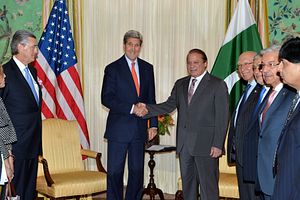Pakistan’s Prime Minister Nawaz Sharif concluded his second official visit to the U.S. since assuming office in 2013. During his visit, Sharif met with Secretary of State John Kerry, addressed the U.S. Chamber of Commerce, and met with U.S. President Barack Obama. Sharif’s visit comes on the heels of the visit to the U.S. by Lt. Gen. Rizwan Akhtar, the chief of Pakistan’s Directorate for Inter-Services Intelligence (ISI).
Sharif’s visit to the U.S. also comes at a time when his domestic position in Pakistan is significantly diminished. The Pakistan Army enjoys a monopoly on issues pertaining to national security, counter-terrorism, and relations with the U.S. and India. A few days prior to the Pakistani prime minister’s visit to the U.S., Sartaj Aziz, a confidante of Sharif, was replaced as the national security advisor by Lt. Gen. Naseer Khan Janjua, the former head of the Pakistan Army’s Southern Command.
In the U.S., the Obama administration is attempting to pressure Pakistan into doing more to bring the Taliban and its new leadership to the negotiating table with the Afghanistan government. The previous round of talks between Kabul and the Taliban in Pakistan were scuttled as a result of the announcement that Mullah Omar, the reclusive leader of the Taliban, had died at a hospital in Karachi in 2013.
Although divided, the Taliban faction under the leadership of Mullah Mansour, who was Omar’s right-hand man since 2010, intensified its attacks in northern Afghanistan and captured the city of Kunduz last month. The fall of Kunduz prompted Obama to backtrack on his decision to withdraw U.S. troops from Afghanistan by 2016.
The Obama administration also remains concerned about Pakistan’s pursuit of tactical nuclear weapons (TNWs). TNWs are considered dangerous because they complicate the safety and security of nuclear weapons and increase the risk of a nuclear escalation to the strategic level, while not particularly adding to deterrence. Reports in the New York Times and Washington Post suggested that the U.S. was willing to offer to “mainstream” Pakistan’s nuclear program in exchange for caps on its nuclear arsenal.
Pakistan’s foreign ministry, however, dismissed any calls for capping its nuclear arsenal, arguing that its TNWs were necessary to counter India’s “Cold Start Doctrine,” a currently non-working and at-best aspirational project of the Indian Army.
The Obama-Sharif joint statement underscored both these themes. The joint statement acknowledged Pakistan’s role in the negotiations between the Afghanistan government and the Taliban and stressed the importance of nuclear safety, security, and nonproliferation.
On other issues, the joint statement was largely unremarkable. Obama acknowledged Pakistan’s reported successes in its counter-insurgency campaigns, while Sharif outlined steps that his government was taking to ensure that terrorist groups, including the Haqqani Network (described as a “veritable arm of the ISI” by former chairman of the U.S. Joint Chiefs of Staff, Adm. Mike Mullen), could not operate from Pakistan.
The U.S. is particularly frustrated with Pakistan for its continued sheltering of members of the Haqqani Network and has threatened to withhold $300 million in Coalition Support Funds to Pakistan for Pakistan’s inaction against the group. There is no word on whether Sharif has managed to sufficiently assuage the U.S.’s concerns to allow for these funds to be disbursed to Pakistan.
On India, the joint statement largely followed a pattern similar to the 2013 U.S.-Pakistan joint statement. Both statements acknowledged the importance of “regional balance,” “stability in South Asia,” and “uninterruptible dialogue” between India and Pakistan on outstanding issues, but the reality of the United States’ rapidly growing strategic convergence with India means that policymakers in New Delhi are unlikely to be overly concerned by such statements.
Notable in the joint statement is the articulation of the need to work together to “address mutual concerns of India and Pakistan regarding terrorism.” The formulation is likely to cause some irritation in India, which has borne the brunt of attacks traced to terrorist groups in Pakistan, including the deadly 2008 attacks in Mumbai.
Pakistan, in the past year, has lobbied hard to draw equivalence between itself and India on the issue of terrorism. To that end, it has attempted to present a narrative of Indian involvement in terrorism in Pakistan. On the sidelines of the United Nations General Assembly, Pakistan’s permanent representative to the UN, Maleeha Lodhi, reportedly presented Secretary-General Ban Ki-moon with three dossiers outlining India’s alleged support to terrorism in Pakistan. Sharif also reportedly shared three dossiers on India during his meeting with John Kerry. Neither Ban Ki-moon nor the U.S. State Department have commented on the veracity of Pakistan’s claims.
For his part, Sharif promised “effective action” against terrorist groups operating in Pakistan, including Lashkar-e-Taiba (LeT), which was responsible for the 2008 attacks in Mumbai and enjoys the Pakistan Army’s patronage. However, Pakistan’s release of Zaki ur-Rehman Lakhvi, the LeT chief and mastermind of the Mumbai attacks, in April this year and the Supreme Court of Pakistan’s lifting of a ban on Jamaat ud-Dawa (the parent organization of the LeT) just last week, belie Sharif’s assertions to Obama.
Questions about these gaps between Pakistan’s claims and ground realities are perhaps best put to Pakistan’s army chief, Raheel Sharif, who visits Washington, D.C. next month.

































